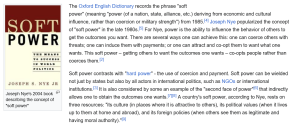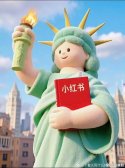View attachment 143631
Editorial from People's Daily, talking about XHS in supportive tone. Note in second last paragraph the author quotes Xi saying hope for future relationship between China and US lies with the people.
I've heard from two sources (Prof Shen Yi and Ayi) saying this event has support from visionary individual from above. I'm guessing when People's Daily throw their hat in and quote Xi like that that's a "if you don't like it and want it changed you're going to have to talk to the boss" type signal, because let's be honest there are heaps of libs in government too.
ChatGPT translation of People's Daily article for your viewing pleasure:
In recent days, the news of American "TikTok refugees" flocking to the Chinese social platform Xiaohongshu has gone viral online. On the platform, Chinese and American users are engaging in lively and friendly interactions around topics like pets, beauty, food, and travel. This bustling activity is likely something the U.S. politicians advocating for a TikTok ban didn’t anticipate.
Today, social media has deeply integrated into people's daily lives, both in China and abroad. For example, TikTok in the U.S. hosts a variety of users: stay-at-home moms sharing parenting tips, freelancers showcasing their talents to attract followers, college students earning side income to pay off loans, and countless small businesses. Some share their daily lives or provide entertainment, while others rely on the platform to connect with resources or generate income. If such a platform were to be banned, many Americans would not only lose a space for communication but also their livelihoods. No wonder some American users jokingly refer to themselves as "refugees."
This news sheds light on the concept of broader trends and the collective will of people. Americans want to live their lives normally, Chinese companies want to develop normally, and citizens of China and the U.S. want to communicate freely. This is the will of the people; this is the trend of the times.
One American user remarked, “On Xiaohongshu, I see a vibrant and authentic China.” Many Chinese users warmly introduce their own lives while sharing captivating stories from across the ocean. Some have likened this encounter between Chinese and American users to a digital version of “Ping-Pong Diplomacy” or a modern “Kitchen Debate.” Beneath these humorous analogies lies a profound truth: openness, exchange, and mutual learning are enduring themes of humanity and deeply rooted desires of people worldwide.
From "TikTok refugees" exploring Chinese social apps to "China Travel" becoming a global trend; from the emotional return of Chinese influencer Li Ziqi, bringing her overseas fans to tears, to Chinese-made games like
Black Myth: Wukong spreading Chinese culture to wider audiences—China today seems to naturally "draw traffic" and exude a "gravitational pull." Undoubtedly, this stems from the nation's profound historical and cultural heritage, its rapidly evolving modern appearance, and its openness, friendliness, and inclusiveness.
As one American user exclaimed, “It’s time to open our eyes and see China!” The connections between nations lie in the closeness of their people. As President Xi Jinping has noted, "The hope for China-U.S. relations lies in the people, and its foundation lies in the grassroots."
We have every reason to believe that in the unstoppable wave of economic globalization and the interconnected world of the internet, the human community with a shared future—where we are all interconnected—will only grow closer and move forward hand in hand.
In this sense, instead of calling them "TikTok refugees," perhaps it's better to call them "villagers of the global village." Instead of “wandering,” it might be more fitting to say they’ve found a “new home.”


